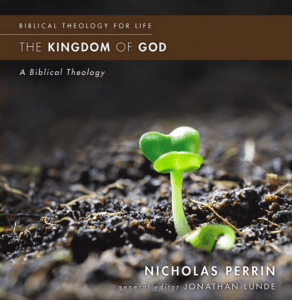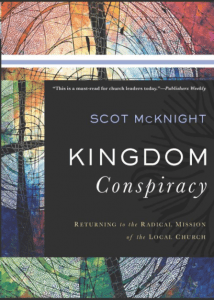This post is by Rubel Shelly, a friend and a leader in the Churches of Christ, and I suspect his post is in part a response to my claim that kingdom work can be done only by kingdom people. Here is his post and I turn it over to you: Agree, disagree? How does it conflict with what I’ve argued?
Kingdom Acts by “The Unchurched”?
The Kingdom of God is simultaneously a concept, a relationship, and a lifestyle. It is the “reign of God” – understood, lived, and acted out. Per Jesus’ statement on the matter, it is not a here-or-there thing (i.e., bounded piece of geography, Israel, the USA); it is the experienced and lived-out presence of God.
So can a non-Christian (i.e., minimally, a non-confessor of Jesus of Nazareth as the Son of God) embrace elements of a “kingdom lifestyle”? And, growing from this question, would an affirmative answer imply universalism? My answers would be, in order, yes and no.
Everything in creation that is truly good is from God and reflects God’s nature. God is “light,” and there is “no darkness” in him (James 1:17). So when truth is told, kindness is displayed, peace is established, or any good thing occurs, a “memory of Eden” is stirred. God’s presence is felt. His nature is on display. The Kingdom of God breaks into human experience. If not, why not? Why would we not claim just that? Why does it not bear witness to God for such things to occur? If the heavens declare his glory, surely joy, peace, and love exhibit his holy nature (cf. Rom. 1:20).
By James’ analogy, even the tiniest shaft of light that breaks into the darkness testifies to that for which humans long and were created. That light identifies the direction in which one should move. Indeed, one is not yet standing in or living in the light. But she has had a glimpse of it and thus has a stimulus for continuing to move in that direction. Why, I’ve always dared hope that an alcoholic’s love for her parent or child was a hopeful sign. Any trace of goodness or the imago dei in her just might be the path along which she could seek God. Her “kingdom act” of love (Can love arise apart from God?) gives hope of her as-yet-unrealized need for the Kingdom of God as a redemptive relationship.
By analogy – one that, by the way, is used along with “kingdom” to describe God’s relationship to his people – consider marriage. Are there premarital concepts, relationships, and activities that witness to the beauty of marriage and draw people to seek that holy relationship? Of course! Ranging from a memory of his parents’ marriage to the growing affection she feels for her boyfriend even to premarital sex they may experience, unmarried (and unsaved) persons are drawn to covenant with each other in holy matrimony. Similarly, people who read of Jesus in the Gospels or experience God’s generosity through a church’s outreach or work shoulder-to-shoulder with believers to bring homeless people off the streets in sub-zero February weather are feeling the tug of (and exhibiting to others) God’s loving presence that may well open them to a redemptive relationship with him.
I can imagine this objection to my analogy: “But those ‘glimpses’ or ‘tugs’ are not the Kingdom of God. One is neither married nor made a citizen of the Kingdom of God by premarital sex or kindness to homeless persons.” Agreed. He or she is, however, given a glimpse of what can be experienced fully within a marital covenant or in Christ. And that is precisely why the claim that universalism is not implied by one’s claim that non-kingdom persons sometime perform kingdom acts. Neither premarital sex nor awareness of another’s healthy marriage transforms a single person into a married person; neither admiration for the inclusive Jesus of Luke’s Gospel nor working with a group of Christians to help homeless persons makes one into a Christian. In both cases, the missing element is not the idea or even certain experiences, but covenant relationship.
Why would I want to argue otherwise? First, perhaps I think analogies cannot establish Christian doctrine or insight. In other words, I want to be a faithful exegete of Scripture. Fair enough. But all the parables are just such teaching devices. By his analogies and metaphors, Jesus helped us grasp and move toward ideas that defy dogmatic formulation. It wasn’t the dogma he was seeking to clarify. He was seeking people to be disciples.
One of the (better) insights I have had into evangelism is that people not only come to Christ by a belief-leads-to-belonging process but also along a belonging-leads-to-belief path. That is, participation with non-Christians in “kingdom work” (i.e., flood relief, rescue of trafficked children, etc.) sometimes removes barriers to their consideration of the gospel. He had thought all Christians were hypocrites or smug exclusivists. But a Christian neighbor’s selfless work to clear a storm victim’s yard – and cordial welcome of a Hindu or atheist neighbor to share in it – changed his impression. A change of impression becomes friendship, and friendship allows conversation. Conversation generates clarification of Christian belief and practice, and clarification may lead to appreciation and embrace.
Didn’t Paul express concern that some church members were in danger of missing out on the kingdom of God? (Gal. 5:21b). Their non-kingdom lifestyle was negating the community’s witness to Christ. So surely the two are separable. Just as one might have a covenant relationship in the absence of unholy behaviors, surely it is possible for another to embrace and model holy (i.e., kingdom) behaviors in the absence of a covenant relationship with Christ.
Second, maybe one’s concern is the confusion such a position might create over who is “in” or “out” of God’s favor. So? Jesus forces one to puzzle over this issue in his Parable of the Pharisee and Tax Collector (cf. Luke 18:9-14). The self-confessed sinner went home “justified” rather than the other-respected religious conservative that day. One could argue that Jesus was offering a centered-set theology over a bounded-set theology in this story. So? What’s wrong with that?
Rather than sensing a need to say that Gandhi, a Muslim co-worker, or a “secular humanist” neighbor cannot be said ever to be doing “kingdom work” by lobbying non-violently for justice, helping the Red Cross at a feeding center, or trying to keep a drug culture out of the local high school, I prefer to say, “He is not far from the kingdom of God” (Mark 12:34). Or, if you prefer, “His actions indicate he might be open to conversation about Jesus.” Or, maybe better still, “I see the gentle ‘light’ and ‘goodness’ of his Creator’s image reflected in those acts, and that gives me hope that he could become a disciple. I must pray for God to show me a way to affirm what I see of the image of God in him and perhaps help him to see what more would be possible in Christ.”
Thus it is hardly “universalism” to detect traces of the image of God in another’s tender heart or kingdom actions. But it could be a positive step in sharing the Good News.











